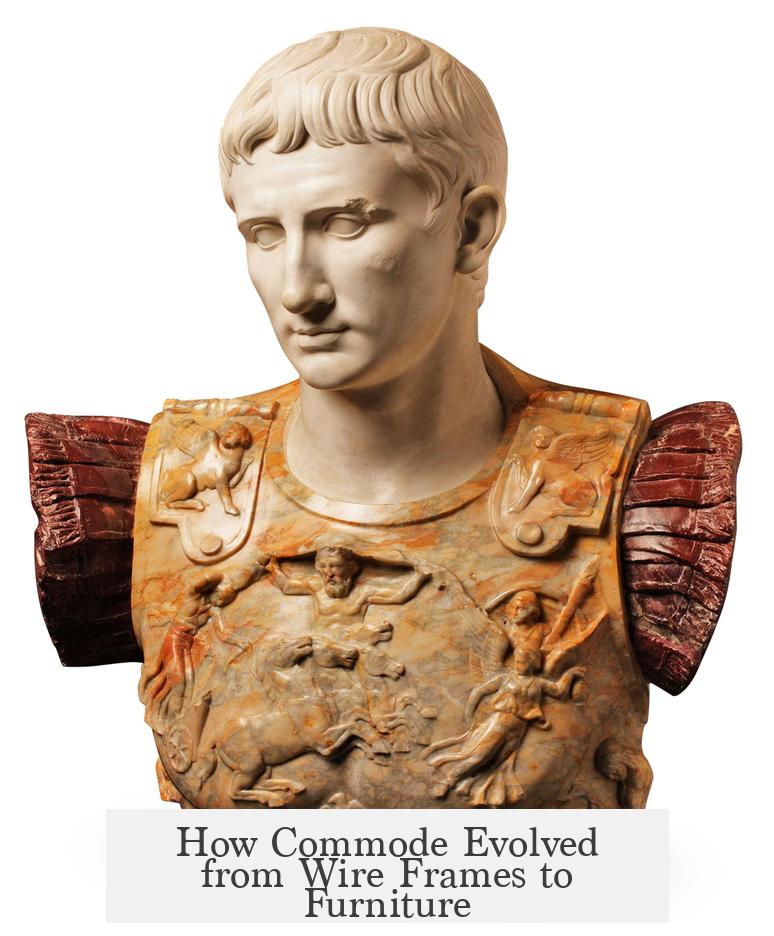The Roman Emperor Commodus did not inspire the word “commode.” The similarity between the emperor’s name and the word is coincidental. The word “commode” has a distinct origin tied to French and Latin roots, and its meaning evolved over centuries without any connection to the emperor.
The word “commode” first appears in the 1680s. Initially, it referred to the wire frame supporting a type of women’s headdress in France. This early usage is unrelated to furniture or toilets. The term comes from the French word commode, meaning “convenient.” This French adjective derives from the Latin commodus, which meant “proper,” “convenient,” or “satisfactory.”
About a century after its first usage, “commode” began describing small, cabinet-like furniture pieces. These were practical and convenient storage units in the home. By the mid-19th century, the meaning shifted further to include a type of portable toilet. The use of “commode” to denote a mobile toilet dates back to 1851. This usage based the name on the convenience it provided to those who could not easily reach a fixed toilet.
This linguistic evolution reflects the core idea of convenience inherent in the Latin root, not a direct link to the emperor Commodus. It is common for popular etymologies to mistakenly connect words to famous historical figures simply because of phonetic similarity. In this case, the context and timeline firmly reject any influence of the Roman emperor on the word “commode.”
- The word “commode” first appears in the 1680s as a term related to a headdress frame.
- It derives from French commode (convenient) and Latin commodus.
- The meaning evolved from headdress frame to small furniture.
- By 1851, “commode” also meant a portable toilet, emphasizing convenience.
- The Roman emperor Commodus has no connection to the word’s origin.
Did the Roman Emperor Commodus Inspire the Word Commode?

No, the Roman Emperor Commodus did not inspire the word commode. It’s tempting to imagine a grand connection between an infamous Roman emperor and a humble piece of furniture or a portable toilet. But language usually has less dramatic and more functional origins than the colorful tales we dream up.
Let’s clear the air before you picture Emperor Commodus lounging on a commode in some ancient Roman palace. The story is far more mundane – yet fascinating in its own right.
Why We Should Always Be Skeptical About Too-Convenient Etymologies
When an etymology sounds too neat or catchy, it’s wise to doubt it. The idea that the word “commode” somehow evolved from Commodus makes for a funny anecdote, but it’s just that: an anecdote.
Language doesn’t owe its existence to jokes or convenient coincidences. Instead, words slowly morph through usage, culture, and practicality. Trusting a “too perfect” story rarely pans out upon closer scrutiny.
Tracing Commode Back to the 1680’s

The first recorded use of the term “commode” dates back to the 1680s. Interestingly, it initially didn’t refer to furniture or toilets at all but rather to a wire frame worn as part of a French woman’s headdress. This origin is more aligned with fashion history than bathroom humor.
This early “commode” involved a structure that provided convenience to the wearer, echoing the later uses of the term connected to functional household items.
From French to Latin – The Root of Commode
The word “commode” has strong linguistic roots in French and Latin. In French, commode means “convenient.” That meaning comes from the Latin commodus, which meant “proper,” “convenient,” or “satisfactory.”
This connection is key: the word’s meaning centers on usefulness and ease, not on any historical figure. It’s a clear example of how language reflects practical human needs.
How Commode Evolved from Wire Frames to Furniture

About a century after its first appearance, the word “commode” transitioned from being associated with headdresses to small cabinet-like furniture. These pieces were designed for convenience, often used to store personal items.
Such furniture was practical and accessible, embodying the meaning of the term. So, “commode” grew to signify an item characterized by its utility.
The Portable Toilet Story – The Commode We Often Think Of
Fast forward to the mid-19th century—specifically, 1851—when the term “commode” began referring to a small, portable toilet. The design made it possible for those unable to reach a fixed toilet to be accommodated with dignity and ease.
Again, the theme is clear: “commode” designates something convenient and suitable, consistent with its Latin root.
Why the Emperor Commodus and Commode Are Just Unrelated Namesakes

Despite sharing a similar spelling and pronunciation, the Emperor Commodus and the word commode diverge in origin and meaning.
- Commodus was a Roman emperor known for his eccentric and often cruel reign.
- Commode derives from the Latin word focused on convenience and suitability.
The emperor’s notoriety has nothing to do with the practical household item or a portable toilet designed for ease.
Lessons from the Commode Etymology for Word Lovers
This example warns us to think twice before accepting catchy origin stories, especially those that seem too humorous or linked to famous figures. Language evolves on the back of social needs and linguistic shifts, not celebrity namesakes.
For example, many words seemingly tied to famous people are false friends in etymology—appealing myths weaving their way into popular imagination.
Could Commodus Have Inspired a Word? Probably Not This One

If you ever stumble upon an etymology linking an infamous character like Commodus to an everyday word, ask yourself: does this make sense historically and linguistically? If the answer is no, the etymology is likely a fun but incorrect story.
Concluding Thoughts
So, no, the Roman Emperor Commodus did not inspire the word commode. Instead, the word comes from the French commode, meaning “convenient,” which itself descends from the Latin commodus, meaning “proper” or “satisfactory.” It initially described a wire frame for fashion, then practical furniture, and eventually, a portable toilet. All are linked by the underlying idea of convenience rather than imperial drama.
Next time you hear someone claim that the emperor gave us the word for a portable toilet, you can confidently debunk that myth. Instead, marvel at how languages adapt practical Latin words into everyday items that make life more convenient.
Isn’t it more satisfying to know that commode means “convenient,” rather than a bathroom throne to a world ruler?
Did the Roman Emperor Commodus inspire the word “commode”?
No, the word “commode” is not linked to Emperor Commodus. Its origin comes from the French word “commode,” meaning convenient, which derives from Latin “commodus.”
When was the word “commode” first used?
The term “commode” first appeared in the 1680s. Initially, it described a wire frame used in a type of French woman’s headdress.
How did the meaning of “commode” evolve over time?
It shifted from describing a headdress frame to a small cabinet-like furniture piece about a century later. Later, it came to mean a portable toilet for those who couldn’t access regular toilets.
Why is a portable toilet called a “commode”?
The name emphasizes convenience. The term for a portable toilet started around 1851, highlighting its role as a practical and movable facility.




